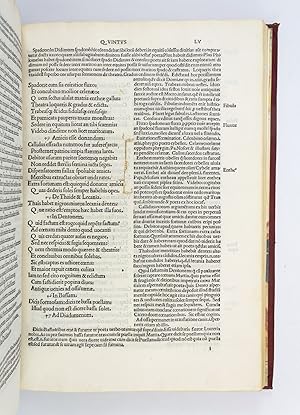About this Item
310 x 215 mm. (12 1/4 x 8 1/2"). LXXXX, 91-114, CXV-CXX, 121-159 leaves (of 160, lacking final blank). Commentary by Domitius Calderinus and Georgius Merula. Handsome 18th century red morocco, gilt, covers bordered with wave roll, raised bands, spine compartments with pomegranate centerpiece, leaf cornerpieces, two olive brown morocco labels, marbled endpapers. Recto of front free endpaper with engraved bookplate of D. Johannis Caroli de Auria ex comitibus Montis Aldei; verso with bookplate of Georgij et Ambrosii de Auria, marchionum Montis Aldei. Title page with 8 x 4/14" paper pasted on at head, to obscure early ink inscription. Some epigrams numbered by hand, occasional early ink marginalia. Goff M-313; BMC V, 597; ISTC im00313000. ?Small abrasion to lower board, extremities lightly rubbed, a couple of leaves a little browned, occasional minor marginal foxing, but A FINE COPY, quite clean and fresh internally, in a well-preserved, extremely attractive binding. This is a particularly desirable copy of the scarce final incunabular edition of Martial's epigrams, offered here in a handsome binding, with desirable provenance, and in fine condition. Born in Roman Spain, Martial (ca. 40 - ca. 103) is said to have invented the genre of the epigram with his brief, witty, and satirical pieces that contrast the scandal of city life with a romanticized notion of his youth in the provinces. Of Martial's corpus of more than 1,500 epigrams, Smith says that "it is impossible not to be amazed by the singular fertility of imagination, the prodigious flow of wit, and the delicate felicity of language everywhere developed in this extraordinary collection, and from no source do we derive more copious information on the national customs and social habits of the Romans during the first century of the empire." This edition includes the commentary of the Italian philologist and scholar Domizio Calderini (ca. 1444-78), one of the most prominent Renaissance editors of classical authors. Venetian printer Christophorus de Pensis came from Mandello, on Lake Como. His first dated work appeared in 1488, and his press was active until the end of the century. ISTC lists 80 works printed by de Pensis, some on behalf of other publishers. The present work was previously owned by the Doria (originally de Auria) family, an old and wealthy Genoese house whose members included princes, counts, and the occasional banker one of whom helped finance Columbus' expeditions. The bookplates of "D. Johannes Caroli" and "Georgii et Ambrosii" can be found in a number of other important early printed works, many of which are similarly bound in 18th century calf or morocco. This edition of the "Epigrams" is a very rare book in the marketplace: we could trace only one other (incomplete) copy at auction. Seller Inventory # ST19952
Contact seller
Report this item
![]()




